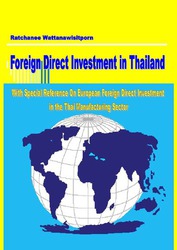| Departments | |
|---|---|
| Book Series (97) |
1381
|
| Nachhaltigkeit |
3
|
| Gesundheitswesen |
1
|
| Humanities |
2370
|
| Medienwissenschaften | 16 |
| Theology | 57 |
| Philosophy | 102 |
| Law | 423 |
| Economics | 852 |
| Social sciences | 417 |
| Sports science | 48 |
| Psychology | 233 |
| Educational science | 190 |
| History | 183 |
| Art | 111 |
| Cultural studies | 166 |
| Literary studies | 117 |
| Linguistics | 88 |
| Natural Sciences |
5407
|
| Engineering |
1798
|
| Common |
98
|
|
Leitlinien Unfallchirurgie
5. Auflage bestellen |
|
Advanced Search
Foreign Direct Investment in Thailand: With Special Reference on European Foreign Direct Investment in the Thai Manufacturing Sector (English shop)
Ratchanee Wattanawisitporn (Author)Preview
Table of Contents, Datei (19 KB)
Table of Contents, Datei (27 KB)
Preface, Datei (8.7 KB)
Preface, Datei (5.8 KB)
Extract, Datei (39 KB)
Extract, Datei (50 KB)
The terms of foreign direct investment (FDI) is frequently considered as concurrently being one of the consequences and drivers of globalisation which result from the existence and actions of multinational corporations (MNCs). In the process of opening up economies toparticipate in some of the positive impacts of globalisation, most of the countries position themselves in respect of attracting foreign direct investment. Besides, the power to attract investment from abroad and its positive impact in improving economies is valued as an important ingredient of the path to successful economic growth and development. The major reason supporting the importance of FDI as a factor in economic growth, particularly in developing countries, is that it can bring to the host economy a number of benefits such as employment generation, business culture, technology transfer, and capital formation.
| ISBN-13 (Printausgabe) | 3865374514 |
| ISBN-13 (Hard Copy) | 9783865374516 |
| ISBN-13 (eBook) | 9783736914513 |
| Language | German |
| Page Number | 304 |
| Edition | 1 |
| Volume | 0 |
| Publication Place | Göttingen |
| Place of Dissertation | Göttingen |
| Publication Date | 2005-05-19 |
| General Categorization | Dissertation |
| Departments |
Economics
|








